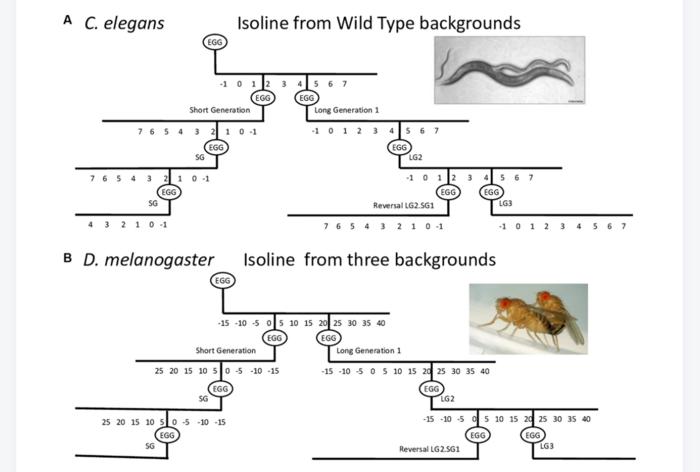“[…] little work [has been] published on the effect of parental age in the nematode Caenorhabditis elegans, a common model organism for aging studies.”

Credit: 2023 Lenzi et al.
“[…] little work [has been] published on the effect of parental age in the nematode Caenorhabditis elegans, a common model organism for aging studies.”
BUFFALO, NY- November 16, 2023 – A new research paper was published in Aging (listed by MEDLINE/PubMed as “Aging (Albany NY)” and “Aging-US” by Web of Science) Volume 15, Issue 21, entitled, “Parental age effect on the longevity and healthspan in Drosophila melanogaster and Caenorhabditis elegans.”
Several studies have investigated the effect of parental age on biological parameters such as reproduction, lifespan, and health; however, the results have been inconclusive, largely due to inter-species variation and/or modest effect sizes.
In their new study, researchers Camille Lenzi, Alexis Piat, Pascal Schlich, Judith Ducau, Jean-Claude Bregliano, Hugo Aguilaniu, and Anne Laurençon from the IM Projet, Caduceum, INRAE, IBDM, Instituto Serrapilheira, and Universite Claude Bernard-Lyon 1 examined the effect of parental age on the lifespan, reproductive capacity, and locomotor activity of genetic isogenic lines of the nematode Caenorhabditis elegans and the fruit fly Drosophila melanogaster.
“We decided to investigate parental age impact on the lifespan of their progeny on selected genomes of flies and worms to gain insights on the molecular mechanisms at work.”
The researchers found that the progeny of successive generations of old parents had significantly shorter lifespans than the progeny of young parents in both species. Moreover, they investigated the fertility, fecundity, and locomotor activity of C. elegans. Interestingly, both the shorter lifespan and deteriorated healthspan of the progeny were significantly improved by switching to only one generation of younger parents.
“Collectively, these data demonstrate that the detrimental effect of older parental age on the longevity of the progeny can be reversed, suggesting the existence of a beneficial non–genetic mechanism.”
Read the full study: DOI: https://doi.org/10.18632/aging.205098
Corresponding Author: Anne Laurençon
Corresponding Email: [email protected]
Keywords: life span, intergenerational plasticity, maternal effect, nematode, drosophila
Sign up for free Altmetric alerts about this article: https://aging.altmetric.com/details/email_updates?id=10.18632%2Faging.https://doi.org/10.18632/aging.205098
About Aging:
Launched in 2009, Aging publishes papers of general interest and biological significance in all fields of aging research and age-related diseases, including cancer—and now, with a special focus on COVID-19 vulnerability as an age-dependent syndrome. Topics in Aging go beyond traditional gerontology, including, but not limited to, cellular and molecular biology, human age-related diseases, pathology in model organisms, signal transduction pathways (e.g., p53, sirtuins, and PI-3K/AKT/mTOR, among others), and approaches to modulating these signaling pathways.
Please visit our website at www.Aging-US.com and connect with us:
- SoundCloud
- X, formerly known as Twitter
- YouTube
- LabTube
Click here to subscribe to Aging publication updates.
For media inquiries, please contact [email protected].
Aging (Aging-US) Journal Office
6666 E. Quaker Str., Suite 1B
Orchard Park, NY 14127
Phone: 1-800-922-0957, option 1
###
Journal
Aging-US
DOI
10.18632/aging.205098
Method of Research
Experimental study
Subject of Research
People
Article Title
Parental age effect on the longevity and healthspan in Drosophila melanogaster and Caenorhabditis elegans
Article Publication Date
1-Nov-2023



